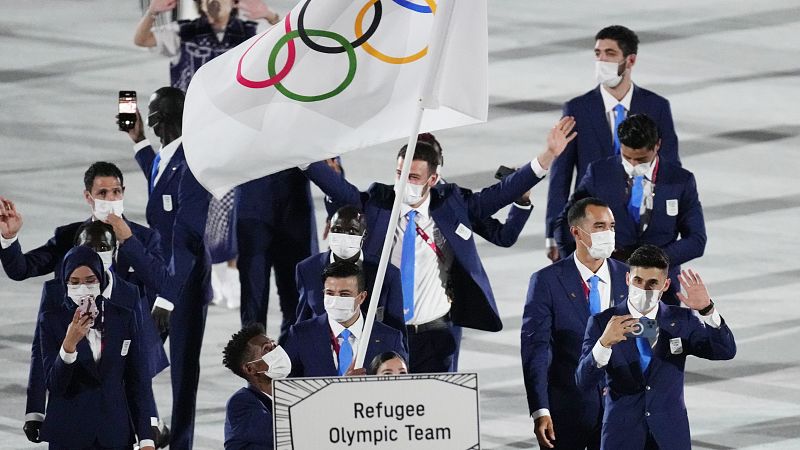Paris 2024: Is less than 40% of women on the Refugee Olympic Team enough?

Slightly more than a third of the Refugee Olympic Team at the Paris Games are women, as female representation has continued to decline since the team’s creation in 2015.
However, the 38% rate of women on the team is not the only drop registered. The Refugee Paralympic Team has less than 13% women.
The number of refugees has tripled in the last decade. At the end of last year, there were 43.4 million refugees globally, according to the UNHCR refugee agency.
Around half of refugees, internally displaced or stateless people are women and girls.
The International Olympic Committee (IOC) emphasises that the event will be the first gender-equal one in history.
Yet, individual sports cases reveal a different story from the reality of the bigger picture.
For Michele Donnelly, associate professor in the Department of Sport Management at Brock University, the IOC is “not meeting their own commitment to gender equality,” especially since they cannot enforce it in a team they have control over.
“I would say it is more symbolic than an actual representation of the issues globally,” Michele Donnelly adds.
Is less than 40% of female representation enough?
According to the charity Women for Women International, “in addition to poverty and other issues that all refugees may face, women refugees have an added layer of oppression from gender discrimination.”
This layer can be seen as “unpaid work in the home, whether that's childcare, caring for older relatives, cooking, cleaning”, says Rachel Williams, policy and public affairs manager at the charity Women in Sport.
The current Refugee Olympic Team has 29 athletes, with only 10 women on the team.
Manizha Talash, a 21-year-old Afghan woman who will contend in breakdance in a first-ever Olympic competition after fleeing to Spain from the Taliban, is one of the inspirational stories about these female migrants making headlines.
“We know how important visibility is to particularly to girls being involved in sport and the inspiration the girls can take from seeing women excel in sport,” added Williams.
While the Women in Sport team prefers to look at the optimistic side and celebrate almost 40% of the team as female, the opinion is not consensual.
“I don't think it's enough,” Donnelly said. “Those places where the IOC has total control need to be role modelling the expectations for everyone, so teams should be gender equal.”
"Not everybody has the same experience of being a refugee, and that there are these increased risks and challenges for women, gender minority and disabled folks as refugees, and all of that does influence who then ultimately gets to be or is able to be part of the refugee Olympic and Paralympic teams."
How are the refugee teams funded?
According to the International Olympic Committee, the majority of the team's athletes are supported through the Refugee Athlete Scholarship Programme, which is managed by the Olympic Refugee Foundation (ORF) and funded by Olympic Solidarity.
The IOC Executive Board selected the Refugee Olympic Team for Paris 2024.
To be eligible, athletes must be elite competitors in their respective sport and be refugees in their host country, recognised by UNCHR.
“Balanced representation in terms of sport, gender and regions will also be taken into consideration,” the ORF stated.
However, Donnelly believes both transparency and accountability are quite lacking.
“We don't have a lot of information about how athletes are selected for the refugee teams," she said.
"This leaves us asking questions and wondering how were we in a place where there are not an equal number of men and women athletes on the refugee teams.”


